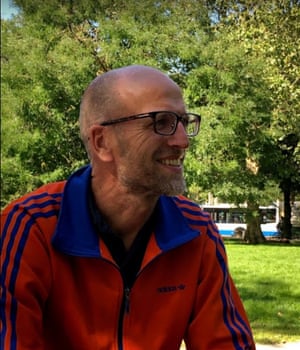Why are there so few prisoners in the Netherlands?
From The Guardian online today (Monday), an interestring article contrasting the Dutch approach to criminal justice with that on this side of the North Sea. It seems that the Dutch prisons are now so empty that space is being rented out to neighbouring Norway and Belgium.
When Stefan Koning, who has a history of psychosis, was found guilty of threatening a stranger with a knife, a long custodial sentence might have felt like the only answer.
In fact, after a short spell in jail, he is back at his home in Amsterdam.
“Bob is a character from Twin Peaks, a murderer who creeps into the skin of innocent people and makes them do terrible things like murder,” says Koning. “There’s a Bob in me who says ‘kill this person’, that sort of thing. If I take my medicines, Bob is quiet.”
Koning is a beneficiary of a growing tendency in the Netherlands to avoid jailing people unless it is necessary. One key aspect of this is a prodigious programme of care in the community for people with psychiatric problems.
“We work on two aims: number one, preventing another crime, and then on psychiatric suffering and the social problems that come with it,” says Hommo Folkerts, a forensic psychologist and outreach worker who helps Koning.
“We don’t treat people with just depression – it’s people with psychotic vulnerability, autism, severe learning difficulties, often in combination with severe personality disorders, addictions, financial problems, no good home or links with family, and often they are traumatised.

“Nobody would approve of the crimes or violence they have committed, but there is a very sad world behind them. If you want to mend all this, it will take a long time.”
In 1988, the UK criminologist David Downes contrasted a relatively humane Dutch prison system favourably against those in England and Wales. Today plummeting prison sentences have left the Netherlands with an unusual problem: it doesn’t have enough inmates to fill its prisons, even after renting out places to Norway and Belgium.
Since 2014, 23 prisons have been shut, turning into temporary asylum centres, housing and hotels. The country has Europe’s third-lowest incarceration rate, at 54.4 per 100,000 inhabitants. According to the justice ministry’s WODC Research and Documentation Centre, the number of prison sentences imposed fell from 42,000 in 2008 to 31,000 in 2018 – along with a two-thirds drop in jail terms for young offenders. Registered crimes plummeted by 40% in the same period, to 785,000 in 2018.
Miranda Boone, a professor of criminology at Leiden University, has studied the collapse in the prison population. “There is no doubt that the prison population has been reduced very significantly in the last 13 years – an amazing and, in the western world, unparalleled development,” she says.
Half of the people in Dutch prisons have received a one-month sentence, she says, and almost half entering detention in 2018 were actually awaiting trial. Experts attribute the decline to a variety of factors, including more sentencing before reaching or outside of the court system – such as fines – than other countries and the use of court-ordered mediation.
But there is also a special psychological rehabilitation programme known as TBS.
“TBS is a rather unique institution in the world,” Boone says. “In many countries there’s a choice: people can be held accountable for their deeds and are sentenced to prison, or not, and be put in a psychiatric institution. We have a psychiatric institution that is part of the criminal justice system for people who can be held not [accountable] or only partly accountable.”
Unlike high-security hospitals in the UK or the Netherlands, TBS has very specific conditions. People must have committed a crime with a minimum prison term of four years and have a high chance of recidivism: the programme works on specifically on their reintegration into society. If this is not deemed possible, or they refuse to cooperate, they can eventually move to a normal high-security hospital and be confined indefinitely.
There were 1,300 people detained with a TBS ruling in 2018: people stay in a treatment centre, sometimes after a jail term, and are treated for the psychological conditions that are thought to have played a role in their crime. Every two years, judges assess whether the treatment should be extended, and the average stay is two years.
For Bas de Vries, 30, Amsterdam’s Inforsa mental health clinic has helped him to build a life again after a traumatic experience in his past led him to commit a violent, schizophrenic attack. “The most important thing in TBS is working on yourself to be able to re-enter society,” he says, from his sheltered home attached to the clinic. “I took a really difficult path. I was ashamed of what had happened and I didn’t really talk openly about it. At a certain stage I started to talk about it, and now I am where I am.”
Like other TBSers, he has periods of leave, and he now has a paid job and is moving back to his home town and completing a qualification as a personal trainer. “I don’t think stronger prison sentences are black and white,” he says. “It depends on the person – some people need it and others don’t.”
Melina Rakic, a psychiatrist and director at Inforsa in Amsterdam, says that TBS cases are always complex – because of psychological disorders but also people’s backgrounds.
“A large proportion of cases are ‘have-nots’. These people are on the one hand extremely dangerous, like the woman this morning, who started a fire for the nth time,” she says.
“They hurt themselves and other people, but these are also people who alongside their personal disorder or psychosis often often grew up with a mother who was an addict and a father who disappeared without a trace, with no money, or no food, or no winter coat … or nobody who says ‘it’s cold outside – take your jacket’. If you don’t have these things as a child, you don’t learn how to make attachments.”
It is difficult to compare figures between those sentenced to a jail term and those offered TBS, but in Inforsa’s experience, its treatment has an effect in reducing recidivism.
“There are often calls from broader society or here in the Netherlands that we need to punish people or punish them harder,” says Rakic. “But we know that for these people, punishment doesn’t help. They end up in prison, they get out, then within a few months they have committed another crime.”
Miriam van Driel, De Vries’s TBS psychologist, believes a humane approach is simply the most logical. “The way you treat people – also in prison – makes a big difference in how they return to society,” she says. “If you treat them like dogs, people will behave like dogs but if you treat them as human beings, they will behave like human beings.”
Gijs Weijters, senior researcher in recidivism at the WODC, points out that suspended sentences are becoming more common in the Netherlands, increasing the role of the probation service. “A large proportion of prisoners stay only for a short period and this is now seen as problematic,” he says. “We know that prison is not good for your life, you may lose your job or your house, and it’s questionable if short sentences help.”
Other reasons for the decrease are a decline in the numbers of young men, and a sharp decrease in the juvenile crime rate – partly because of an obligation for police to provide an advocate for arrested juveniles, partly because property is better protected and also, says Weijters, “because juveniles spend more and more time online”.
However, there are complications. There is a lot of public concern about psychiatric patients who sometimes do not come back from periods of parole, especially after one raped and killed a young woman, Anne Faber, in 2017. A police union has repeatedly raised concerns about crime that is simply unregistered, such as drug crime, and a report in Amsterdam said the city could not tackle drug-related criminal activity. It has led some experts to wonder if the Netherlands’ low prison population might be a result of failures in crime detection.
“We try to give rehabilitation opportunities, through our TBS institution,” says Boone. “But if we don’t prosecute serious criminal behaviour, then that’s not a reason to be proud.”
The names of the Inforsa patients in this article have been changed at their request
The original article can be found HERE

![16[2]](https://mojoscotland.org/wp-content/uploads/2024/06/162-1024x768-394x330.jpg)

